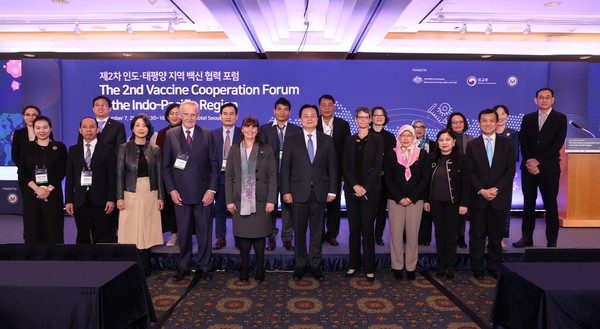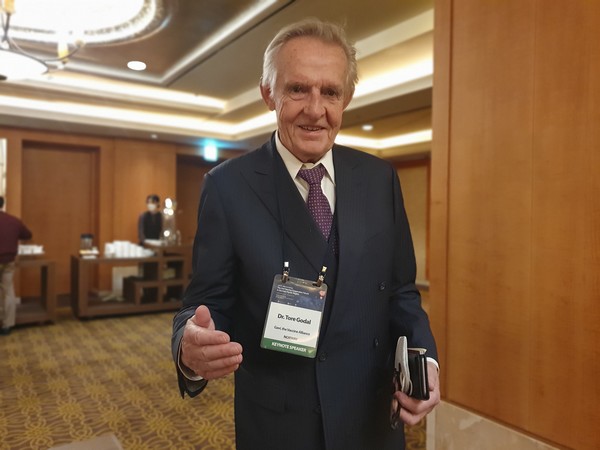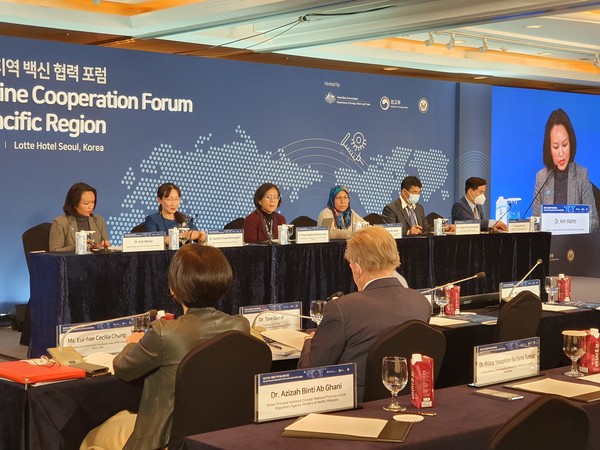Ambassadors, government officials and public health experts in the vaccine field across the Indo-Pacific region gathered at a forum in Seoul to share lessons and strategies for strengthening resilience and preparedness against future pandemics at Lotte Hotel on Wednesday.
The 2nd Vaccine Cooperation Forum in the Indo-Pacific Region was co-hosted by Korea's Ministry of Foreign Affairs, Austraila's Department of Foreign Affairs and Trade, and the U.S. Department of State.

The Vice Minister of Foreign Affairs, Cho Hyun-dong, together with the U.S. and Australian ambassadors delivered opening remarks as co-hosts of the event, highlighting their pledges to the pandemic fund, and policies like the Indo-Pacific strategy and the revision of the International Health Regulations to promote regional vaccine security.
Vice Minister Cho showed Korea’s commitment to vaccine security referencing Korea’s $300 million contribution to the pandemic fund pledged at the recently concluded G20 summit in Indonesia by President Yoon Suk-yeol and regional trainee programs in vaccine biomanufacturing.
‘Annual vaccine encompassing more variants should be long-term strategy’
Dr. Tore Godal, founding CEO of Global Alliance for Vaccines and Immunization (GAVI), delivered the keynote speech. Citing the WHO’s Global Vaccine Market report 2022, he pointed out that Pfizer dominated the vaccine market during the Covid-19 pandemic both in volume and sales value in 2021.
However, excluding the Covid-19 vaccine, the Serum Institute of India recorded the largest vaccine doses while MSD dominated vaccine sales, he said.
This indicates that the vaccine market share is a bit skewed which impacts vaccine access, and thus greater efforts are needed to ensure vaccine equity, he went on to say.

Godal mentioned some ongoing investment projects with the Coalition for Epidemic Preparedness Innovations (CEPI) in the Indo-Pacific region including the development of mRNA platforms in Korea and Thailand, technical collaboration on the development of Nipah vaccines across Malaysia, Singapore and Japan, the development of a molecular clamp vaccine platform in Australia and support for fractional dose clinical trials in Indonesia, to name a few.
In a separate interview with Korea Biomedical Review, Godal highlighted leadership potential in the Indo-Pacific region through major vaccine manufacturers like SK Bioscience from Korea and Biofarma from Indonesia.
He added, “While it’s unlikely that the Covid-19 virus will disappear because of its high infection rate, an annual vaccine encompassing more variants should be our long-term strategy.”
Also referencing CEPI’s 100-day challenge, he said that clinical trial sites prepared to facilitate trials on short notice is crucial to achieving safe and effective vaccines against viral threats in 100 days.
When asked about major upcoming projects at GAVI, he said that collaborating with more regional institutions to deliver vaccines to remote communities will be a priority and also mentioned a change in management as CEO Seth Berkley will be stepping down after leading the company for 12 years.
Panelists share each countries’ vaccine strategy
In the first panel discussion on vaccine security, moderated by Dr. Anh Wartel, Deputy Director General at International Vaccine Institute (IVI), the panellists shared their Covid-19 lessons.

Dr. Azizah Ghani of Malaysia’s pharmaceutical regulatory agency started by remarking on Malaysia’s risk-benefit assessment which helped them deliver conditional fast-track vaccine registration. Meanwhile, Vietnam’s Ministry of Health (MOH) representative, Dr. Hoang Son said they will include the Rotavirus, pneumococcal disease, cervical cancer, and seasonal flu, in the Expanded Immunisation Programme (EPI) for the 2021-2030 period to increase vaccine diversity.
Subsequently, Lao’s MOH representative stressed the importance of data in surveillance and supply chains to guide decision-making.
Next, Dr. Sunate Chuenkitmongkol of Thailand’s Vaccine Institute referenced the ASEAN Vaccine Security and Self Reliance (AVSSR) mentioning areas for collaboration in developing human resources and a framework for regional vaccine stockpiling.
Lastly, Indonesia's MOH Acting Director of the Immunization Directorate added that its mRNA tech transfer project with the WHO and Afrigen is progressing, but still noted that further work is needed to accelerate the speed of mRNA tech transfers with WHO hub spoke countries.

